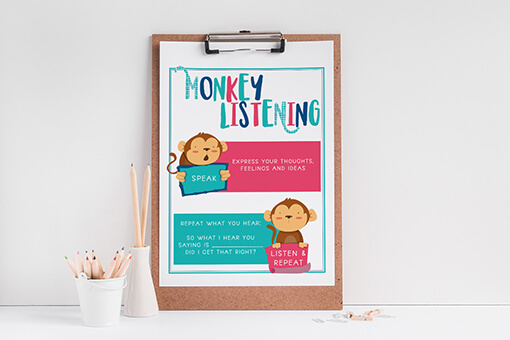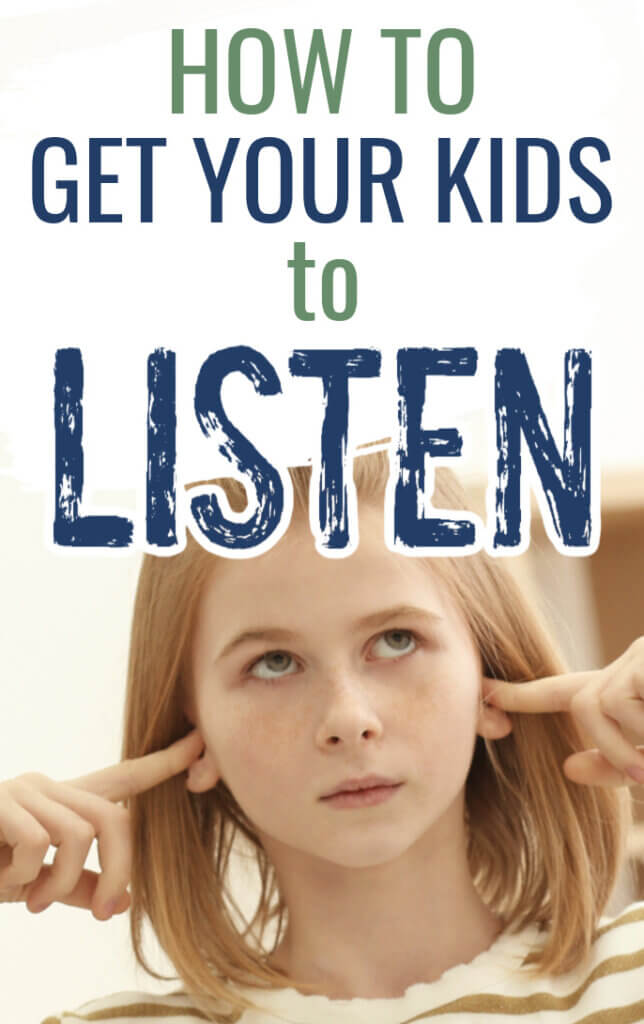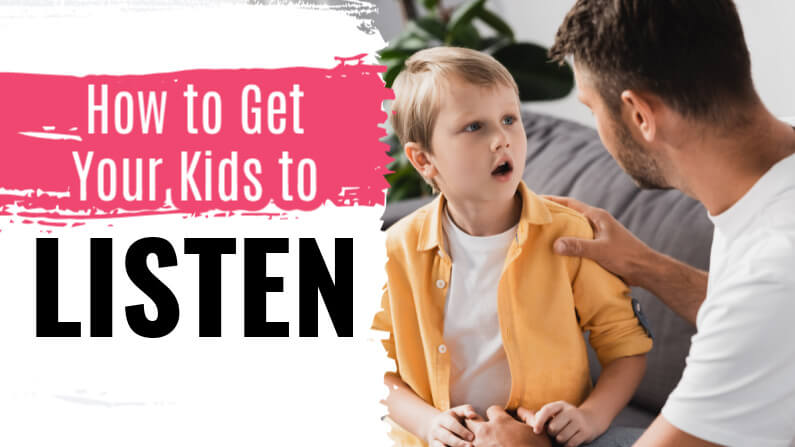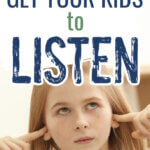If you’re like just about every other parent I know, you find yourself asking, “how do I get my kids to listen to me?” on a daily basis. There is nothing more frustrating than asking your child to do something and getting no response, or worse, getting defiance directed back at you.
Becoming stuck in these negative patterns of not listening can lead to a lot of anger, frustration, and feelings of defeat. The good news is that there are simple things you can do to actually get your kids to listen to you!
Why kids don’t listen
Before we jump in, it is important to take a quick look at the reasons behind your child’s refusal or inability to listen to you. Kids don’t listen for many different reasons including:
- Power struggles
- Emotional struggles (like having trouble with a friend at school)
- Behavioral or mental health issues (like ADHD)
- Hearing issues
Digging Deeper into Why Your Child Isn’t Listening
I find it is helpful to sit down with a pen and paper and list out observations about what is going on in my child’s life. This helps clue me in to what might be behind their not listening. Your list could look something like this:
- Seems to only want to play video games
- Isn’t happy with school – not sure why
- Talks disrespectfully to me and everyone else in the house lately
- Enjoys spending time with his friends – especially if they are playing video games together
Once you have your list, take a look at it and see if there are any common themes. You can also look for anything that brings up questions. For example, I notice on the list above that I mentioned video games multiple times. I also noticed that he is unhappy at school but I wasn’t sure why – that makes me curious to learn more.
Now, you can use this list to help inform what areas you want to focus on when it comes to getting your kid to listen to you. For example, with video games, you may find that your child isn’t using a lot of eye contact and is often ignoring you because they are wrapped up in a game. Teaching actual listening skills may be very helpful. (See #2 and #3 below.)
Or, with the potential emotional issues going on with school, you may need to focus on spending some quality time with your child. Work on understanding and listening to their thoughts and emotions. Spending this time may help your child begin to open up and be more willing to respond appropriately.

How to get your Kids to Listen
Listening for children can be a process of learning new skills, dealing with environmental issues, and working on the parent-child relationship. Here are 7 ways to get your children to listen to you.
1. Get Rid of Distractions
Distractions have become a major part of all of our lives. We have cell phones, laptops, iPads, Xboxes, and all the other devices that fill our days. For kids, there is often nothing more distracting than an engaging video game.
If you have ever tried to talk with your child while they are in the middle of a game, you know how frustrating the task can be! Here are a few tips for dealing with distractions like video games.
Timing
It is helpful to think through your timing before asking your child to take out the trash or get ready for bed. For example, if your child is engaged in a video game, ask yourself, does this need to be done right now or could I wait until they are at a good stopping point? If the request can wait, you can say something like, “when you get to a good stopping point, will you let me know?”
Try reframing your request with a respectful qualifier if the request can’t wait, or if your child never gets to that good stopping point and continues to play. You could say something like, “I know you are in the middle of your game, but I really need some help setting the table, so we can have dinner on time. Will you please turn off your game and come help?”
You can also try a timed approach. Try saying something like, “Dinner is in 10 minutes, please find a good stopping point in the next 5 minutes to come help me set the table.”
Parenting Distractions
Looking at your own distractions is also important. If you are busy scrolling on your phone, or in the middle of working on your laptop, throwing out a request may fall short. Your child will read the situation as one that is not important enough for you to give attention to. Therefore, they may decide it is not important enough for them to comply with.
As much as possible, try to step away from devices and distractions when you ask your child to do something. Doing this communicates that what you are saying is important.
Putting down your phone, or other distraction, is also a much more respectful way to talk with anyone, including your child. Showing your child that you respect them, models how to show respect. Giving respect also encourages children to return respect to you.
2. Teach and Expect Eye Contact While Talking/Listening

Eye contact is an incredibly important piece to communicating. Studies have shown that the ability to listen, comprehend, and understand what is being said is improved with eye contact.
Eye contact also communicates to the speaker that the listener is paying attention. This can be an important part of interactions between parents and kids.
Eye contact is a skill that is taught through modeling the behavior. You can also openly teach eye contact by talking with your child about what it is and how to do it. Children also learn through games.
The Mirror Game
The mirror game is a great way to teach eye contact. To play this game, stand facing your child. Instruct your child to pretend that they are looking into a mirror and you are their reflection. Have them do slow movements, such as raising their arms or spinning in a circle. Mirror the movements that your child makes. Then, switch roles and have your child be the reflection and follow your movements.
3. Teach Your Kids How to Use Active Listening Techniques
Listening is a skill that has to be learned. I love Active Listening skills which really help anyone learn to be better at listening. As an added benefit, using active listening also helps the speaker feel heard and understood. Here are two ideas for teaching active listening to kids.
Monkey Listening

Monkey listening is great for teaching kids to repeat what they heard. It is a process of repeating and asking if what they heard is right. Here is how a Monkey Listening Conversation could go:
Mom: I am feeling really frustrated by the mess in here. There are clothes toys, and books everywhere!
Child: So what I hear you saying is that the mess in here is making you frustrated?
Mom: Yes, it is. Would you please clean it up?
Child: I will, but I want to finish my game first.
Mom: Okay, what I hear you saying is that you are going to wait to finish your game, is that right?
Child: Yes, I’m right in the middle of it.
Mom: Okay, you can have half an hour but then it needs to be completed.
Child: Okay, I will make sure I do it in half an hour.
Notice how each participant rephrases and repeats what the other person just said and allows them a chance to correct or confirm that they have heard correctly. This type of listening takes practice. In my course: The Be Heard Method, I provide a number of games and resources to help you teach your child to listen including in-depth instructions on how to teach Monkey Listening!

Taking Turns
Another good listening skill is learning how to take turns. To teach a child or children how to do this, try using an object. The object can be passed around and only the person with the object is allowed to talk. Everyone else needs to listen and wait for their turn.
4. Swap Your Words to Reduce Power Struggles
Sometimes the tone of voice or words that we use can throw us straight into a power struggle. You have probably experienced this with a spouse or a boss. Think of a time that they asked you to do something and you found yourself feeling disrespected, frustrated, unseen, angry, and unwilling to comply. As parents, our words and tone of voice can play a big part in whether or not our children comply.
Am I Being Too Controlling
One area that has to be looked at is control. Just like in the situation that you thought of a second ago with your spouse or boss, children don’t like to feel like we are trying to control their every move. Encouraging your child to become your partner in solving problems will always work better than demanding that they become your minion and do your bidding. An e
How to Swap Words to Take Out The Control Factor
An easy way to take control out of a request is to frame it as a problem that needs solving. For example:
Instead of: Go Clean Your Room
Try: I noticed that your room is really messy, I wonder what we could do to make sure that we don’t start losing things that are important to you?
Instead of: I need you to do the dishes tonight
Try: I’ve been feeling really exhausted from doing all of the dinnertime chores including meal prep, cooking, clearing the table, and doing the dishes. I wonder if you have any ideas that might help me out?
5. Address Underlying Issues That May Be Causing Defiance
Another very important area to explore if you find your child is having trouble listening is to examine underlying issues that may be leading to defiance. Here are a few common issues that you can look for.
Is My Child Looking for Attention or Deeper Connection
Sometimes children will purposely try to get a rise out of their parents in order to get attention. And really, there is no better way to make a parent upset than to not listen or talk back when asked to do something! If you suspect that this may be the case with your child, try scheduling some one-on-one time. I find that it is very helpful to have scheduled weekly or bi-weekly quality time with my boys. I am always amazed at how much of a difference this time makes in their behavior throughout the week.
Are There Bigger Issues That Need to be Addressed (ADHD, ODD, Hearing Issues)
If your child struggles with issues such as ADHD, ODD, or even a hearing issue, it is important to understand that these will play into their ability to listen. Working with a therapist or behavioral specialist is often very helpful in addressing listening issues related to mental or physical health issues.
Are There Emotional Triggers Going On in Your Child’s Life
Emotional triggers such as trouble at school or having their parents get divorced can cause many children to become “uncompliant”. There are multiple reasons for this including:
- Being distracted and having trouble staying focused on directions
- Feeling out of control and searching for any and every way to have some sense of control
- Acting defiantly out of anger
- Feeling like no one sees that they are struggling so they try to get attention in inappropriate ways such as not listening
6. Work on Seeing and Naming Your Child’s Emotions
As you can see, there are all kinds of deeper issues that may cause a child to not listen. Finding ways to see and name your child’s emotions can go a long way in solving some of the underlying issues that lead to kids not listening.
The first step to seeing and naming emotions is to be aware. Notice your child’s facial expressions, tone of voice, and word choice. Do they look/sound mad, sad, hyper, etc. Once you notice, you can say something simple like, “it looks like you are feeling mad right now.” This opens up space for your child to express their feelings and feel seen and heard by you.
Once you have noticed and named an emotion, the second step is to validate your child’s emotion and help them find ways to work through it. So, if you noticed your child was mad, you could move on to asking them what they are angry about. Your job is to listen – not judge or try to fix anything at this stage. Once your child has expressed why they are upset, you can ask them something like:
- Do you need help calming down?
- Is there anything I can do to help?
Asking your child these questions shows that you are there and available for them. These questions also validate your child’s emotions. If your child is needing help calming down, one of the best tools that I use is this Calm Down Coping Skills Deck. It has 11 different calm down activities that really work well for kids.

7. Practice, Practice, Practice
Because listening is a skill that needs to be taught, practice is a very important part of teaching your children to listen. I love playing games with my kids that promote good listening. This way they are getting practice but don’t feel like I am cramming skills down their necks. Here are some of my favorite games that encourage listening skills.
Use Games to Teach and Improve Listening Skills
Telephone: To play this classic game gather your whole family (it works best when played with 5+ people). The first person thinks of a sentence and whispers it in the next persons ear. Then, the listener passes the sentence on by whispering it in the next persons ear and so on. When you get to the last person, they say the sentence out loud seeing if the words made it correctly through the string of “telephones”.
Red Light Green Light: To play this game, have one person be the light and stand across the room (or play it outside and have them stand 10-20 yards away from everyone else.) The light then calls out green light and players are allowed to walk or run towards the light. When the light calls red light everyone has to stop. If the light sees anyone running after they have called red light, that player has to go back to the starting point.
20 Questions: This is a great game to develop questioning, listening, and critical thinking skills. Have one person choose a person, place or thing. Then everyone else gets to ask questions to try to guess what the person place or thing is. The trick is that the questioners only get 20 questions to figure it out and every question can only be answered with a yes or no.
Listening Scavenger Hunt: Another fun activity is to create a listening scavenger hunt for your children to do. I think these are most fun to do while taking a walk around the neighborhood or a park. Here are some examples of things that kids could listen for:
- A bird chirping
- An airplane
- Wind rustling the trees
- Someone talking
- Music
- A dog barking
- Laughter
- Running Water
- A truck
- A car door closing
The Process of Understanding How to Get Your Kids to Listen
Learning to parent in a new way can take a lot of time and effort. Try picking a single area to work on and creating a small goal – maybe 1 new skill per week.
For example, you may decide that your child really needs to learn some listening skills because they never make eye contact. Spend the week teaching and reinforcing this skill. Use lots of positive reinforcement every time you see your child use eye contact.
You should also use positive reinforcement for yourself. Let’s face it, as a parent, you are half of the equation when it comes to getting your kids to listen. Rewarding and reinforcing your efforts are just as important! So, is there a reward you can give yourself for sticking with your plan and completing a weekly goal?
Finally, don’t be discouraged if you find your child taking small, slow steps, or taking a step forward and then regressing back to not listening well. Learning to listen is a process.


